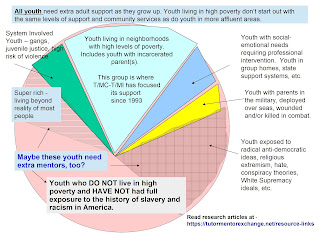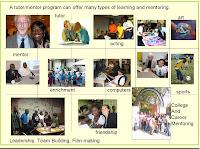For the past few years as I've watched horrendous tragedy of youth using AR-15 rifles to murder groups of people, as in Buffalo this past weekend, I've begun think that there is another category of young people who need a lot of extra mentoring and adult support.
At the right is a graphic showing a vision that I've had for many years, of creating a much more detailed understanding of what types of programs are available within a geographic area. You can see this graphic in this blog article.
Below is a view of the Tutor/Mentor Program Locator which we launched in 2004, based on the printed Directory we had published since 1994. It enabled people to search by type of program, age group served and location, to find programs in different parts of Chicago.
Below is a view of the Tutor/Mentor Program Locator which we launched in 2004, based on the printed Directory we had published since 1994. It enabled people to search by type of program, age group served and location, to find programs in different parts of Chicago.
This has been an archive since 2018. You can read about it here. If someone creates a segmented understanding of programs in their area, this is a way to share that information and help those programs attract volunteers, donors, students and media attention.
Below is an updated version of the graphic shown above.
I've added another sub-category focusing on youth growing up surrounded by adults who have adopted anti democratic conspiracy theories, religious extremism, White Supremacy thinking, etc.
At the left is a graphic that I include in a presentation titled "Defining Terms". The graphic shows five categories of youth who could benefit from help provided by volunteers in organized, on-going, tutor, mentor and learning programs. The large light blue area in the middle, showing youth living in high poverty areas, has been where I've focused my efforts for more than 40 years.... helping kids in high poverty areas get extra support that aids them in the journey from birth-to-work.
I updated this graphic yesterday.
However, I added two more shaded areas. One focuses on children of the super-rich, who grow up living in a far different reality and level of experiences than do most other kids. Can they empathize with the challenges other kids face, and use their wealth, power and influence to help society overcome these challenges?
The second shaded area is more troubling. This includes all youth who are growing up surrounded by adults who have adopted anti democratic conspiracy theories, religious extremism, White Supremacy thinking, disinformation from FOX News and other sources, etc. The terrorist who murdered 10 people at a Buffalo supermarket was clearly influenced by such an environment.
But that's the goal I've shared for 20+ years.
Now I think we need to be finding ways to reach kids who don't live in poverty (without reducing our on-going efforts to provide more and better programs and support to kids who DO live in poverty areas). I don't even know where to start.
Well, I do, really, I need to find a place where someone is collecting articles and research about this and also aggregating links to organizations working to combat the formal and informal grooming that is turning so many young people into disenchanted, destructive human beings.
The graphic below shows categories in the Tutor/Mentor web library at https://tutormentorexchange.net/resource-links. I can add another category but I'm not sure what to name it yet.
I'll share this article on my social media posts and look for suggestions and recommended links from my network. I don't intend to make this the primary focus of the library, but hope to be able to point to others who do make this the primary focus of their work.
This page shows links to my social media pages, such as LinkedIn, Twitter, Instagram and Facebook. I look forward to connecting with you there.















No comments:
Post a Comment